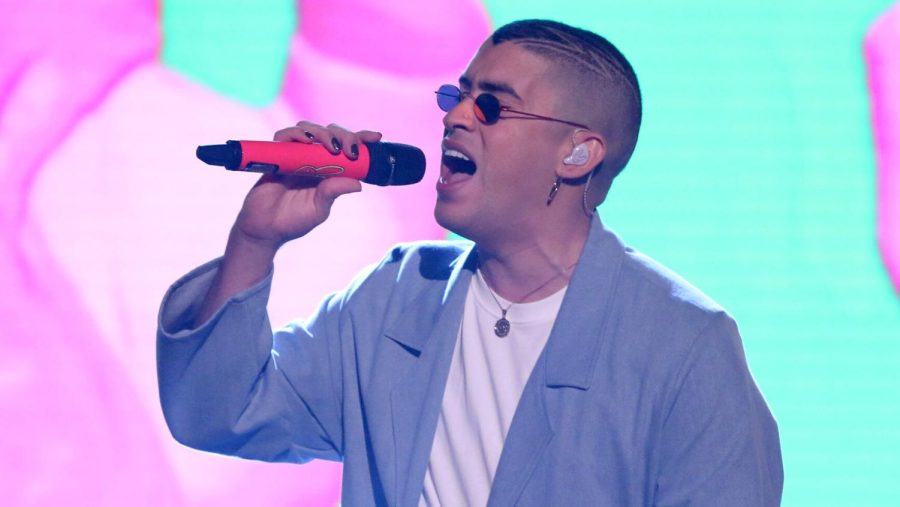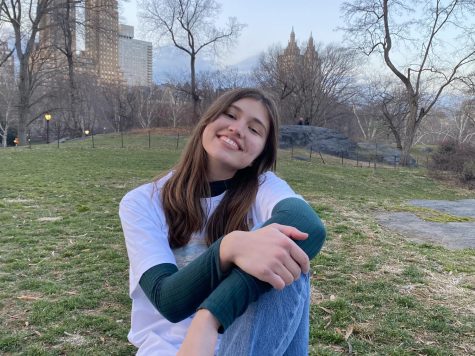Latinx representation in media: The popularization of reggaetón
Benito Antonio Martínez Ocasio, popularly known as “Bad Bunny”, performs on the Tonight Show with Jimmy Fallon. Photo courtesy of NBC.
October 6, 2022
In recent years, Latinx media has seen an increase in popularity, specifically beyond the Latinx community. For the first time, things that were once traditionally Latinx are becoming “mainstream,” raising questions of cultural appreciation versus appropriation in media. This two-part series will explore the current effects of Latinx culture becoming mainstream in music and film in the context of the U.S.
It is important to note that Latinx music has always reflected the diverse makeup of Latinx cultures. It was created by Latinx people and for Latinx people. However, with increased globalization, and with music streaming services and music videos becoming more accessible, Latinx music has reached a wider audience than it ever has before.
Reggaetón, a genre with roots in Caribbean music and largely influenced by the African diaspora in Latin America, has especially seen an increase in popularity. A signifying shift towards a global popularization of reggaetón was the release of “Despacito” by Luis Fonsi and Daddy Yankee in 2017. After creating an English version featuring Justin Bieber, “Despacito” tied for the record of longest song to remain on Billboard’s Hot 100. According to NBC News it was only the third time that a song with lyrics predominantly in Spanish hit #1 on Billboard’s Top 100 Chart in the U.S., after “La Bamba” by Los Lobos in 1987 and “La Macarena” by Los Del Rio in 1996. After the release of “Despacito,” there was an increase in Latinx artists doing collaborations with U.S. artists, along with Latinx artists in the U.S. feeling more comfortable singing in Spanish.
However, “Despacito” was not an appreciation of Latinx music for what it is. By creating this English version featuring a popular white singer, “Despacito” felt like a watered-down version of reggaetón. In order to cross cultural boundaries, the song had to find a middle ground, therefore sacrificing part of its cultural value. “Despacito” was more of a step into acceptance of Latinx music rather than complete representation.
A more current artist who is popularizing music entirely in Spanish is Benito Antonio Martínez Ocasio, more popularly known as “Bad Bunny.” Bad Bunny has become a household name that everyone, whatever their connection to Latinidad, can recognize. Martínez Ocasio is crossing cultural boundaries and has been able to do so while staying true to his Puerto Rican roots. His global success has been a source of pride for Puerto Ricans and Latinx people everywhere.
Not only has Martínez Ocasio been popularizing reggaetón, he has been using his platform to share important messages along with it. In the past, reggaetón has been criticized for being a genre that promotes misogynistic messages, but Martínez Ocasio fights back against that connotation, spreading gender inclusive messages. In his song “Yo Perreo Sola,” Martínez Ocasio emphasizes how women should be able to dance alone without harassment.
“Si no quiere bailar contigo, respeta, ella perrea sola,” Martínez Ocasio sings. “If she doesn’t want to dance with you, respect her, she dances alone.”
In his music video, he dances dressed in drag, moving away from “machismo” culture and towards a culture where sexuality and femininity can be expressed.
Martínez Ocasio has also been taking political stances through his music. His song “Estamos Bien” was released in 2018, about a year after Hurricane Maria, and raised awareness about its lasting effects on Puerto Rico. In his performance on the Tonight Show with Jimmy Fallon that year, Martínez Ocasio shared that “On September 20th, 2017 Puerto Rico was exposed to the full force of nature’s ferocity. After one year of the hurricane, there are still people without electricity in their homes. More than 3,000 people died and Trump’s still in denial.”
In Martínez Ocasio’s recent record breaking album “Un Verano Sin Ti” which allowed him to become the first Latin artist to top the Billboard Artist 100 Chart, he continues to promote political and humanitarian issues in Puerto Rico. His song “El Apagón” highlights the current issues with gentrification in Puerto Rico; its music video, released shortly before Hurricane Fiona hit Puerto Rico on Sept. 18 2022, featured a 23-minute documentary on the topic. The documentary includes first hand accounts of those affected, along with an analysis of the history of colonization in Puerto Rico, and how the current Act 22 is continuing that history.
Martínez Ocasio recognizes how his platform can help raise awareness about Puerto Rico, and he wants others to as well, which comes back to the question of cultural appropriation. Many people are streaming “El Apagón” and other songs from “Un Verano Sin Ti” without knowing the meaning. This is demonstrative of a lack of effort put in by listeners to be aware of Puerto Rican culture as a whole, ignoring the more difficult realities.
“Culture appropriation would be just listening to that song, dancing, jumping up and down to it, but not looking up the gentrification situation in Puerto Rico and acknowledging it, not thinking about it, and letting it pass by,” Macalester Latinx Student Union member Sophia Salinas ’24 said.
So how can people who are not Latinx enjoy Latinx music while still being respectful of its cultural significance? It’s no doubt that music like reggaetón is catchy — that much can be understood despite cultural differences — but the cultural value behind these songs is often overlooked. The result ends up being people who take advantage of Latinx culture, taking its value away from the Latinx community.
“There is a fine line between appropriation and appreciation,” Karin Velez, a professor of history at Macalester, said. “The appropriation comes with its heart in the right place, [and] there is this kind of attempt to understand, but it falls so short that it can often be painful.”
It is also essential that consumers of Latinx music recognize that music like reggaetón belongs to the Latinx community, and therefore it is important to leave spaces for Latinx people to enjoy music with those who have similar cultural connections to it and have had to navigate the same cultural divides. This is largely why cultural organizations at Macalester such as Latinx Student Union are so important.
In the end, Latinx culture is for Latinx people, whether it is considered “cool” by others or not. Recognizing that is an essential part of respectfully enjoying aspects of that culture such as music. It’s okay to appreciate Latinx culture in all its beauty, but it is impossible to respectfully “pick and choose” what parts of Latinx culture to pay attention to and what parts not to. Latinx music is rooted in a culture that goes far beyond catchy rhythmic compositions, and because of that, it will always belong to Latinx people.
“Ahora todos quieren ser Latinos,” Martínez Ocasio sings in “El Apagón.” “No, ey, pero les falta sazón.”
Follow up next week for a related discussion on Latinx representation in film.















Jaylynn Rodriguez • Oct 8, 2022 at 10:01 am
I wish this article had chosen to speak to Puerto Rican students about the situation in PR and the appropriation of Reggaeton, which IS Puerto Rican, not just broadly from the Caribbean. Yes, reggaeton is shared by and enjoyed by lots of Latinx people, but the same appropriation happens within our own community, especially as non-Boricuas participate in it. It’s important to specifically center Reggaeton as a part of Puerto Rican culture and expression because that’s exactly what it is. I feel like it’s only in recent years that we’ve seen other Latinx people engaging in it, because when I grew up all of the reggaeton was from Puerto Rican artists, and now you have artists like Rosalía trying get into it as well (lol). Which is fine, reggaeton is music and music is a way of bringing people together, it’s meant to heard and shared. But it has roots, and that matters, especially when we’re talking about the politics of Puerto Rico.
I mean I still see other Latinx people calling Bad Bunny trash and even making fun of his accent, saying they can’t understand him. I’ve seen people straight up say that Puerto Ricans and other Caribbeans don’t even speak real or ‘proper’ Spanish. Meanwhile lots of non-Boricua/non-Caribbean artists attempt to mimic it in their songs. Caribbean culture in general has been repeatedly downplayed, whitewashed, appropriated, misunderstood — all while continuing to thrive and push forward regardless of that.
I will never deny the impact Bad Bunny has had on raising awareness of issues on the island. I fundamentally believe that because of him, we saw so many people even aware of Hurricane Fiona and talking about Act 60 and colonization. When I grew up in the States, people didn’t even know what Puerto Rico was, and it’s a literal US colony. And when they DID know what it was, they called it dangerous and bad, or were just severely misinformed. I grew up with a colonized view of Puerto Rico because I grew up in a society that did not value our beauty, diversity, and strength. And that’s still happening to this day. I’m thankful music made people realize we exist, but I just wish that all of the people at this school that preach anti-colonialism actually hold true and speak out against the colonization our own country continues to perpetuate, in Puerto Rico, in Hawaii, and in Guam.